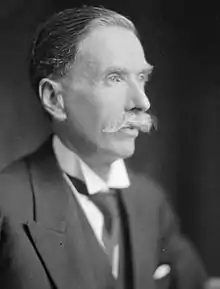Thomas Sidey
Sir Thomas Kay Sidey (27 May 1863 – 20 May 1933) was a New Zealand politician from the Otago region, remembered for his successful advocacy of daylight saving time.
Sir Thomas Sidey | |
|---|---|
 | |
| 15th Attorney-General of New Zealand | |
| In office 10 December 1928 – 22 September 1931 | |
| Preceded by | Frank Rolleston |
| Succeeded by | William Downie Stewart Jr |
| 28th Minister of Justice of New Zealand | |
| In office 18 December 1929 – 28 May 1930 | |
| Preceded by | Thomas Wilford |
| Succeeded by | John Cobbe |
| Personal details | |
| Born | Thomas Kay Sidey 27 May 1863 Dunedin, New Zealand |
| Died | 20 May 1933 (aged 69) Dunedin, New Zealand |
| Political party | Liberal Party (1901-28) United Party (1928-33) |
| Spouse(s) | Helena Baxter |
| Children | 1 |
Early life
Sidey was born on 27 May 1863, to John and Johan Murray Sidey, in the Dunedin suburb of Corstorphine. His father had come to wealth during the Otago Gold Rush as a storekeeper. Tom Sidey attended Otago Boys' High School and graduated from the University of Otago with a law degree (LLB) in 1889. In the following decade, he worked as a solicitor.[1]
He married Helena (née Baxter) on 17 June 1903. They had one son.[1]
Political career
| New Zealand Parliament | ||||
| Years | Term | Electorate | Party | |
| 1901–02 | 14th | Caversham | Liberal | |
| 1902–05 | 15th | Caversham | Liberal | |
| 1905–08 | 16th | Caversham | Liberal | |
| 1908–11 | 17th | Dunedin South | Liberal | |
| 1911–14 | 18th | Dunedin South | Liberal | |
| 1914–19 | 19th | Dunedin South | Liberal | |
| 1919–22 | 20th | Dunedin South | Liberal | |
| 1922–25 | 21st | Dunedin South | Liberal | |
| 1925–28 | 22nd | Dunedin South | Liberal | |
| 1928 | Changed allegiance to: | United | ||
Sidey was a member of the Caversham Borough Council. He was elected Mayor of Caversham on three occasions: in 1894, 1899 and 1901.[1]
Sidey was elected to the House of Representatives in the Caversham by-election as an independent liberal in 1901.[2] The by-election was caused by the death of Arthur Morrison.[3] Sidey joined the Liberal Party as part of its left (radical) wing, and stayed with the party until the end.
Sidey represented the Caversham electorate from 1901 to 1908, and then the Dunedin South electorate from 1908 to 1928, when he retired. He was then appointed to the Legislative Council from 1928 until 1933.[2]
Sidey was Attorney-General (1928–31) and Minister of Justice (1930–31) in the United government.[2]
Sidey put forward a private member's bill for putting clocks forward an hour in summer every year from 1909. It was nearly passed in 1915. It was passed in the House of Representatives but rejected by the Legislative Council in 1926. It was finally approved in 1927.[1]
Death
Sidey died at home on 20 May 1933. He was survived by his wife and son, Stuart Sidey.[1] His son became Mayor of Dunedin from 1959–65. His widow, Helena, Lady Sidey, was appointed an Officer of the Order of the British Empire for social welfare services, especially in connection with women's organisations, in the 1953 Coronation Honours.[4] The Royal Society of New Zealand awards the T. K. Sidey Medal at irregular intervals for "outstanding scientific research".[5]
References
- Olssen, Erik (22 June 2007). "Sidey, Thomas Kay 1863 - 1933". Dictionary of New Zealand Biography. Retrieved 21 July 2010.
- Wilson, James Oakley (1985) [First ed. published 1913]. New Zealand Parliamentary Record, 1840–1984 (4th ed.). Wellington: V.R. Ward, Govt. Printer. OCLC 154283103.
- "Deaths". Otago Witness (2489). 27 November 1901. p. 43. Retrieved 21 July 2010.
- "No. 39866". The London Gazette (4th supplement). 1 June 1953. p. 3004.
- "T. K. Sidey Medal". Royal Society of New Zealand. Retrieved 7 August 2015.
| Political offices | ||
|---|---|---|
| Preceded by Frank Rolleston |
Attorney-General 1928–1931 |
Succeeded by William Downie Stewart |
| Preceded by Thomas Wilford |
Minister of Justice 1929–1930 |
Succeeded by John Cobbe |
| New Zealand Parliament | ||
| Preceded by Arthur Morrison |
Member of Parliament for Caversham 1901–1908 |
Constituency abolished |
| Preceded by James Arnold |
Member of Parliament for Dunedin South 1908–1928 |
Succeeded by William Taverner |